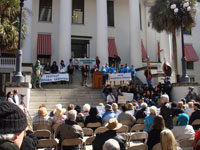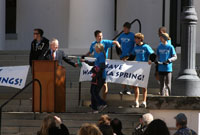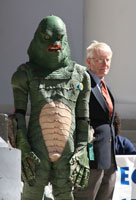Legislators urged to get tough on protecting springs - 'Stop talking and do something!'
Legislators urged to get tough on protecting springs - 'Stop talking and do something!'
Videos by GUE
Article first appeared in The Tallahassee Democrat on February 17, 2010
One by one, the speakers climbed the steps of the Old Capitol and recounted with wonder seeing their first Florida spring. The same words poured out: crystal, clear, liquid light.
"Bubbles stuck to green grass like diamonds," recalled former Weeki Wachee Springs mermaid Barbara Wynns.
But those descriptions no longer flow.
Wynns held up a ziplock bag of black gunk for the crowd.
"This is what our sand and eel grass looks like now," she said.
The degradation seen at the one-of-a-kind Florida attraction has been seen at springs throughout the state, including nearby Wakulla Springs. About 250 people turned out for the Florida Springs Rally to demand lawmakers do more to protect the fragile resource. In the last five years, legislation intended to stop further harm to the state's more than 700 springs has failed.
"If they don't do something this year, it's going to get real bad," said Laura Dailay, who traveled from her home near Fort White on the Ichetucknee River. She punctuated speakers' remarks with shouts of, "Stop talking and do something!"
Sen. Lee Constantine, R-Altamonte Springs, and other lawmakers pledged their
support. "This is the year. We have to do something," said Constantine, who sponsored a spring protection bill that died last year and urged citizens to put pressure on their representatives.
On a state level, spring advocates say more stringent land use planning and regulations are needed in spring watersheds controlling fertilizer use, septic systems, storm water runoff and wastewater facilities.
"We have always thought about springs as the beginning," said Jim Stevenson, head of the Wakulla Springs Basin Workgroup and coordinator of the event. "We've learned the spring is the end of the pipe."
On the podium was a plastic bottle filled with water from Wakulla Spring on Tuesday morning and carried by runners from Maclay School in a 16-mile relay to the event. Stevenson said studies showed some of the water in the bottle came from deep in the aquifer and was decades old. Some, he said, came from a toilet flush at the Capitol just 45 days ago.
"This water carries a message, it tells us who we are and how we treat the land," he said. "We should have taken action to protect our springs 20 years ago. The second-best thing ... is doing something this legislative session."
The federal government also is currently considering setting a limit for nutrients in Florida springs to help improve water quality. Nutrients, such as nitrates, contribute to the growth of algae and other invasive plants that can choke a spring. A hearing on the new rule was held in Tallahassee earlier that day. Public comment is being taken through March 29.
At the rally, Emma Christine McCoy, a seventh-grader in the IB program at Fairview Middle School and a sixth-generation Floridian, spoke plainly about her hopes. Her grandmother was a lifeguard at Wakulla Springs in the 1940s, and Emma has been going to the spring all her life.
She said: "I would like for (my children) to ride the glass bottom boat and see the spring as clear as I did."




